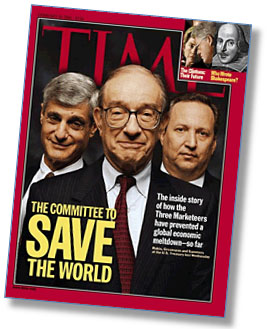Just in case you’re thinking that Russia’s economic problems are little more than a fitting karmic payback for Vladimir Putin, you might want to think twice. When the global economy is fragile, sometimes even small events can send the whole system into cardiac arrest,  and that affects everyone, not just Putin and his cronies. So in case you’ve forgotten, here’s a brief refresher on the events of August 1998:
and that affects everyone, not just Putin and his cronies. So in case you’ve forgotten, here’s a brief refresher on the events of August 1998:
- Russia devalues its currency and defaults on its sovereign debt.
- Markets that are already jittery thanks to the East Asian financial crisis go into full-blown frenzy mode.
- Money pours out of low-quality emerging market investments and into high-quality US, Japanese, and European bonds.
- As a result, yield spreads between low-quality and high-quality bonds widen sharply.
- Long Term Capital Management, which had made large bets on spreads narrowing as the East Asian crisis receded, is blindsided, suffering huge losses.
- As LTCM gets close to insolvency, Bear Stearns stops clearing their trades. Death is imminent.
- Because LTCM is so highly leveraged, its debts exceed $100 billion and its collapse thus threatens every bank on Wall Street. Amid growing panic over a systemic meltdown, the Fed finally steps in and arranges a bailout package. Crisis over—for now.
This is not going to happen again. The world is not the same now as it was in 1998. It’s just meant as an example of how an otherwise limited financial crisis can have a global impact. The fact that it begins with a Russian currency crisis is merely a felicitous coincidence.
But also a bit of an unnerving coincidence. More than likely, Russia’s problems will be contained to Russia. But they might not be, so we should all be careful what we wish for.


















